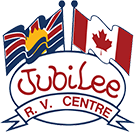THE BASICS OF RV PROPANE SYSTEMS
 The vast majority of modern RVs feature a propane system of some sort. RV manufacturers tend to prefer the fuel over other systems for its effectiveness and convenience. If you’re new to RVing though, you might not know how to use propane and you might have some questions about its safety.
The vast majority of modern RVs feature a propane system of some sort. RV manufacturers tend to prefer the fuel over other systems for its effectiveness and convenience. If you’re new to RVing though, you might not know how to use propane and you might have some questions about its safety.
Here at Jubilee RV Centre, we want to make sure our customers have all the information they need. Below, you’ll find all the basic information you need to know about propane before you head out camping in your RV. If you have more questions, feel free to give us a call here at our Kamloops, British Columbia location. For propane system maintenance, give us a call and set up an appointment with our skilled technicians. We’re located near Vancouver, Kelowna, and Prince George, British Columbia.
WHAT IS PROPANE?
At normal pressure and temperature, propane is a clear, flammable gas. Propane was discovered in the mid-19th century and it developed as a byproduct of the gas production industry. It’s relatively stable, consistent, and burns with a hot blue flame. Gas stations distribute propane in its compressed form, which is a liquid that fills large, pill-shaped bottles. When you connect the propane tank to your RV’s propane system, the liquid expands and fills the lines as a gas.
WHY IS IT USED?
Propane is nearly ubiquitous in modern RV design. It’s a cheap fuel that’s easy to find. It’s also easy to use and can be adapted to many different applications. Many RVs use propane to power the stove, furnace, water heater, and even the refrigerator. Many generators can be adapted to run on propane, too, and that makes it a valuable source for powering electronic gadgetry.
One of the main reasons so many appliances are designed to run on propane is that it can go just about anywhere you go and still provide energy. Solar energy is only helpful if you get plenty of sunlight, but propane can be used in almost any environment. For boondocking, otherwise known as dry camping, propane gives you the ability to get off the grid and camp where you like without having to worry about how you’ll heat your RV and run your appliances.
WHAT ARE THE RISKS ASSOCIATED WITH PROPANE?
As long as you follow some basic safety protocol and respect the product, propane is usually very safe. The first and most important step is to take your RV in for regular propane system maintenance. Technicians will be able to test the lines for leaks and problems and fix anything before it becomes a problem. Remember that the more appliances you have that run off propane, the more lines and connections there will be, and the more potential leak sources you’ll have.
It’s important to protect the propane bottles because they contain the largest concentration of fuel. You’ll probably notice that propane tanks are usually painted white or off-white. This is to help the bottles reflect sunlight and heat. It’s important to keep them away from heat sources. Take whatever steps possible to prevent the tanks from receiving damage. Always be careful when transporting propane bottles and make sure not to drop them. Never fire guns near a propane tank.
HOW DO YOU MAINTAIN PROPANE SYSTEMS?
Maintaining a propane system is a task that’s best left to the professionals. While it may seem relatively simple, especially if you consider yourself somewhat handy, there are many potential ways to get it wrong if you start taking the wrenches and screwdrivers to your propane system. You can usually tell if your system needs maintenance by looking at the flame. A flickering flame that’s orange or yellow in color indicates a problem in the system. If an appliance stops working, that’s another good indication something is up.
For all your propane needs, give us a call here at Jubilee RV Centre in Kamloops, British Columbia. Our team of RV technicians will make sure your RV is properly equipped to be safe on your next trip. We proudly serve the areas of Vancouver, Kelowna, and Prince George, British Columbia.

